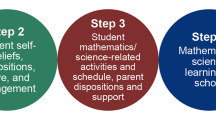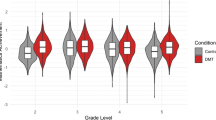Abstract
The mathematical preparedness of science undergraduates has been a subject of debate for some time. This paper investigates the relationship between school mathematics attainment and degree outcomes in biology and chemistry across England, a much larger scale of analysis than has hitherto been reported in the literature. A unique dataset which links the National Pupil Database for England (NPD) and Higher Education Statistics Agency (HESA) data is used to track the educational trajectories of a national cohort of 16-year olds through their school and degree programmes. Multilevel regression models indicate that students who completed advanced mathematics qualifications prior to their university study of biology and chemistry were no more likely to attain the best degree outcomes than those without advanced mathematics. The models do, however, suggest that success in advanced chemistry at school predicts outcomes in undergraduate biology and vice versa. There are important social background differences and the impact of the university attended is considerable. We discuss a range of possible explanations of these findings.



Similar content being viewed by others
References
Adkins, M, & Noyes, A. (2016). Reassessing the economic value of advanced level mathematics. British Education Research Journal, 42(1), 93–116.
Armstrong, B., Fielding, M., Kirk, S. & Ramagge, J. (2014). Factors affecting success in CHEM101 at UOW. Australian Mathematical Society Gazette, 41, 91–98.
Attridge, N. & Inglis, M. (2013). Advanced mathematical study and the development of conditional reasoning skills. PLoS ONE, 8(7), e69399.
Brogt, E., Sampson, K. A., Comer, K., Turnbull, M. H. & McIntosh, A. R. (2011). Using institutional research data on tertiary performance to inform departmental advice to secondary students. Journal of Institutional Research, 16(2), 26–41.
Brown, G (2009). Review of education in mathematics, data science and quantitative disciplines: Report to the group of eight universities. Group of Eight (NJ1). Retrieved from https://go8.edu.au/sites/default/files/docs/go8mathsreview_0.pdf
Carpenter, J., Goldstein, H. & Kenward, M. (2011). REALCOM-IMPUTE software for multilevel multiple imputation with mixed response types. Journal of Statistical Software, 45(5), 1–14.
Confederation of British Industry. (2015). Inspiring growth: CBI/Pearson education and skills survey 2015. London, United Kingdom: Pearson.
Comer, K., Broght, E. & Sampson, K. (2011). Marked for success: Secondary school performance and university achievement in biology. Journal of Institutional Research, 16(2), 42–53.
Darlington, E., & Bowyer, J (2016). How well does A-level Mathematics prepare students for the mathematical demands of chemistry degrees? Chemistry Education Research and Practice, 17, 1190–1202
Donovan, W. J. & Wheland, E. R. (2009). Comparisons of success and retention in a general chemistry course before and after the adoption of a mathematics prerequisite. School Science and Mathematics, 109(7), 371–382.
Gove, M (2011). Michael Gove speaks to the Royal Society on maths and science. London, United Kingdom: Department for Education. Retrieved January 4, 2017 from http://www.education.gov.uk/inthenews/speeches/a00191729/michael-gove-speaks-to-the-royalsociety-on-maths-and-science.
Groen, L., Coupland, M., Langtry, T., Memar, J., Moore, B. & Stanley, J. (2015). The mathematics problem and mastery learning for first-year, undergraduate STEM students. International Journal of Learning, Teaching and Educational Research, 11(1), 141–161.
Heck, A. & van Gastel, L. (2006). Mathematics on the threshold. International Journal of Mathematical Education in Science and Technology, 37(8), 925–945.
Hoban, R. A., Finlayson, O. E. & Nolan, B. C. (2013). Transfer in chemistry: A study of students’ abilities in transferring mathematical knowledge to chemistry. International Journal of Mathematical Education in Science and Technology, 44(1), 14–35.
Hodgen, J., Pepper, D., Sturman, L. & Ruddock, G. (2010). Is the UK an outlier? An international comparison of upper secondary mathematics education. London, United Kingdom: Nuffield Foundation.
Hulme, J. & De Wilde, J. (2014). Tackling transition in STEM disciplines: Supporting the Science, Technology, Engineering and Mathematics (STEM) student journey into higher education in England and Wales. York, United Kingdom: Higher Education Academy.
Little, R. (2006). Calibrated Bayes: A Bayes/frequentist roadmap. The American Statistician, 60(3), 213–223.
Noyes, A. (2009). Exploring social patterns of participation in university-entrance level mathematics in England. Research in Mathematics Education, 11(2), 167–183.
Nicholas, J., Poladian, L., Mack, J. & Wilson, R. (2015). Mathematics preparation for university: Entry, pathways and impact on performance in first year science and mathematics subjects. International Journal of Innovation in Science and Mathematics Education, 23(1), 37–51.
Nicoll, G. & Francisco, J. S. (2001). An investigation of the factors influencing student performance in physical chemistry. Journal of Chemical Education, 78(1), 99–102.
Royal Society (2011). Preparing for the transfer from school and college science and mathematics education to UK STEM higher education: A ‘State of the Nation’ report. London, United Kingdom: Author.
Rylands, L. & Coady, C. (2009). Performance of students with weak mathematics in first-year mathematics and science. International Journal of Mathematical Education in Science and Technology, 40(6), 741–753.
Sadler, P. M. & Tai, R. H. (2007). The two high-school pillars supporting college science. Science, 317, 457–458.
Shulruf, B., Hattie, J. & Tumen, S. (2008). The predictability of enrolment and first year university results from secondary school performance: The New Zealand National Certificate of Educational Achievement. Studies in Higher Education, 33(6), 685–698. doi:10.1080/03075070802457025.
Spencer, H. E. (1996). Mathematical SAT test scores and college chemistry grades. Journal of Chemical Education, 73(12), 1150–1153.
Stan Team (2015). Stan: A C++ library for probability and sampling (Version 2.7.0.) [Software]. Available from http://mc-stan.org/.
Tai, R. H., Sadler, P. M. & Loehr, J. F. (2005). Factors influencing success in introductory college chemistry. Journal of Research in Science Teaching, 42(9), 987–1012.
Acknowledgements
This research is part of the Rethinking the Value of Advanced Mathematics Participation project, funded by the Nuffield Foundation [EDU/41221]. The Nuffield Foundation is an endowed charitable trust that aims to improve social well-being in the widest sense. It funds research and innovation in education and social policy and also works to build capacity in education, science and social science research. The views expressed herein are those of the authors and not necessarily those of the Foundation. More information is available at www.nuffieldfoundation.org.
Author information
Authors and Affiliations
Corresponding author
Rights and permissions
About this article
Cite this article
Adkins, M., Noyes, A. Do Advanced Mathematics Skills Predict Success in Biology and Chemistry Degrees?. Int J of Sci and Math Educ 16, 487–502 (2018). https://doi.org/10.1007/s10763-016-9794-y
Received:
Accepted:
Published:
Issue Date:
DOI: https://doi.org/10.1007/s10763-016-9794-y




